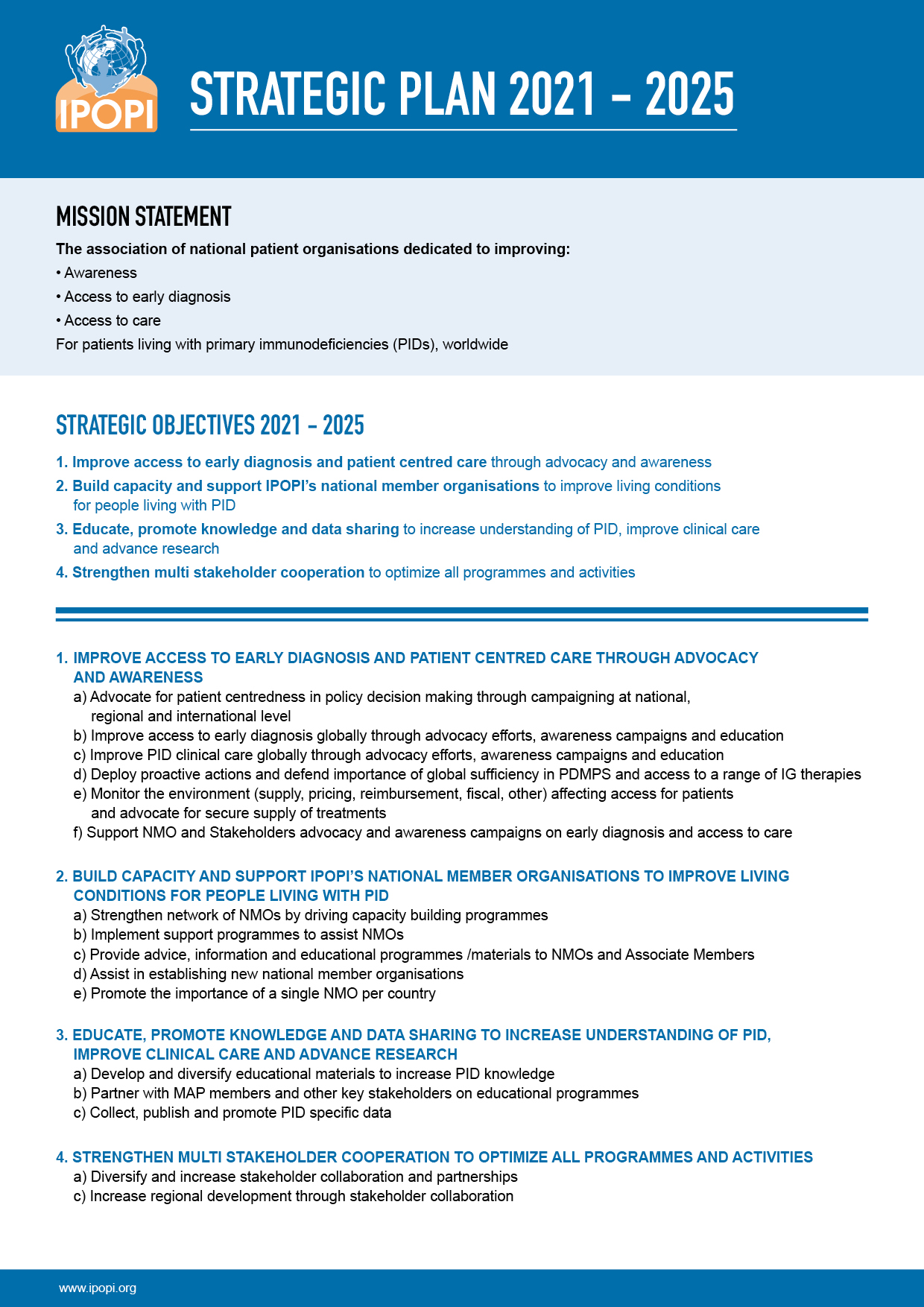IPOPI launches new strategic plan
In the last 24 months, IPOPI undertook a thorough and comprehensive process to develop its new 5-year strategic plan for the 2021-2025 period. The plan was designed taking into account IPOPI’s significant growth over the last few years whilst being clearly geared to the future. An in-depth analysis of the fast-evolving primary immunodeficiency (PID) environment and patients priority needs and outlooks, enriched by the consultative input of key stakeholders, guided IPOPI’s Board and staff in the plan’s development process. IPOPI’s 2021-2025 strategic plan will ensure the continued success of IPOPI in its mission to increase awareness of PIDs and improve access to care and diagnosis for all PID patients in the years to come. And ultimately improve their quality of life.
Improving access to early diagnosis and patient-centred care
The PID field is developing at a fast pace. With over 430 Human Inborn Errors of Immunity identified in the latest classification published by the International Union of Immunological Societies (IUIS), the last decade has seen the number of known PIDs more than doubled. Our understanding of crossovers with autoinflammatory and autoimmune mechanisms but also of the interaction with other conditions such as allergies and cancers has improved tremendously. Major research, treatment and diagnosis advances (including genetics and newborn screening) have been made leading to precision medicine. The last years have also witnessed the increasing use of artificial intelligence and e-health solutions paving the way for increased diagnosis and treatment capabilities. Ensuring that patient-centredness successfully underpins the processes by which these advances are made is a key component of this first strategic objective. Set against this, divergences in access to treatment and diagnosis rates are still posing huge challenges that need to be tackled. Through a range of advocacy, awareness raising and educational campaigns and programmes (including some aimed at improving clinical care standards) IPOPI remains steadfast in its commitment to bring about long-term sustainable improvements in the diagnosis of PID and equitable access to appropriate patient-centred care for all PID patients.
Building capacity and supporting our national member organisations
Strengthening and supporting our network of national member organisations to ensure that living conditions for PID patients keep improving worldwide has always been a key strategic priority for IPOPI. In order to do so, IPOPI is committed to empower its patient organisations leaders to serve their community effectively. We will continue to support our growing network of national member organisations (NMOs) through programmes contributing towards their campaigns and projects. Skills-building workshops and tools will be deployed to enhance the organizational capacity to represent the needs of all PID patients and to strengthen our NMO leadership’s skills-set to better advocate for the improvement of diagnosis and care in their country. Youth leadership development also features on our capacity building agenda. Emphasis will be put on the importance of having a unified approach when it comes to the representation of patient interests to guarantee the voice of PID patients is taken into account by their key stakeholders.
Educate, promote knowledge and data sharing
IPOPI is committed to diversify its range of educational and knowledge-sharing materials, tools and events. Information is a powerful tool: we aim to empower our community through increased knowledge and awareness of key PID patient priorities and exploring new areas of interests. We will communicate and promote dialogues around the fast-developing advances being made in terms of science, diagnosis and clinical care but also on the policy, legislative and regulatory fronts. Building key datasets with the implementation of data collection tools will enable us to deliver our advocacy campaigns more effectively through an evidence-based approach. We will support efforts to launch and improve PID registries and will promote the need for collaboration, standardization and interoperability to support international research and clinical efforts. For healthcare professionals we will continue to roll out events, educational tools and resources to improve clinical management and patient outcomes. Strong collaboration with our medical advisory panel and other key stakeholders such as those involved in our IPOPI network of experts will underpin all of these efforts as well as the use of new technologies to increase awareness, share knowledge, provide networking and other learning opportunities.
Strengthening multi-stakeholder cooperation
At the core of every activity undertaken by IPOPI is the recognition that we are stronger when we work together. The COVID19 pandemic has once again proven us that this is not only a nice statement but an absolute necessity. Stakeholder collaboration will remain at the heart of our advocacy and awareness-raising activities but will also be utilized to increase regional and national development. IPOPI has gone from strength to strength in the last few years and we are committed to safeguard a well-functioning organization and its financial health through sustainable, diversified and increasing partnerships. We will optimize our programmes and activities through multi-stakeholder cooperation to improve our overall efficiency and effectiveness.
IPOPI Strategic Objectives 2021-2025
- Improve access to early diagnosis and patient-centred care through advocacy and awareness
- Build capacity and support IPOPI’s national member organisations to improve living conditions for people living with PID
- Educate, promote knowledge and data sharing to increase understanding of PID, improve clinical care and advance research
- Strengthen multi-stakeholder cooperation to optimize all programmes and activities




